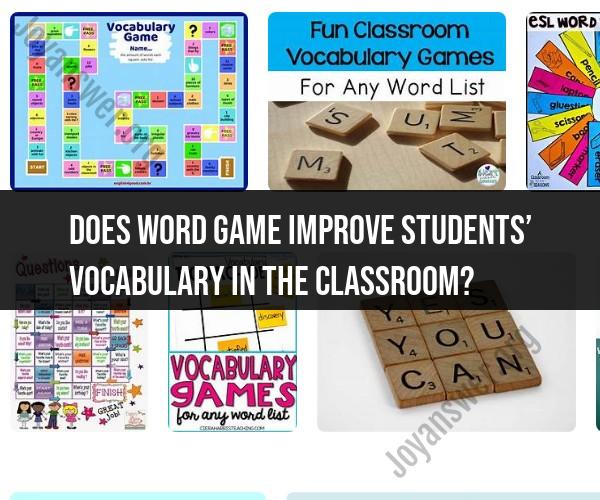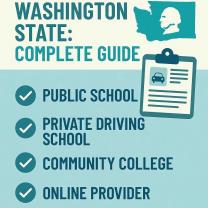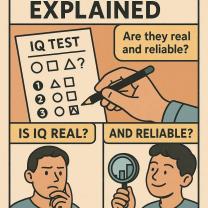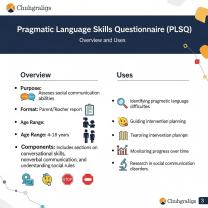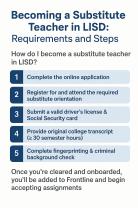Does word game improve students’ vocabulary in the classroom?
Yes, word games can be an effective and enjoyable way to improve students' vocabulary in the classroom. Here are several ways in which word games can help enhance students' vocabulary:
Engagement and Motivation: Word games are often fun and interactive, which can motivate students to actively participate in vocabulary-building activities. When students enjoy the learning process, they are more likely to retain and apply new words.
Contextual Learning: Word games provide a context for learning new vocabulary. When students encounter words in meaningful and memorable contexts, they are more likely to understand and remember their meanings.
Active Learning: Word games require students to actively engage with words, such as by defining them, creating sentences, or matching them to meanings. This active involvement in the learning process can lead to better retention.
Exposure to Varied Vocabulary: Word games can introduce students to a wide range of words, including synonyms, antonyms, homophones, and idiomatic expressions. This exposure can enrich their vocabulary and language skills.
Word Recognition: Games like crossword puzzles and word searches help students recognize and become familiar with new words. This recognition can make it easier for students to understand and use these words in different contexts.
Spelling and Pronunciation: Many word games involve spelling and pronunciation, which can improve students' ability to correctly spell and pronounce words.
Word Formation: Games like Scrabble or Boggle encourage students to form words using given letters. This promotes creativity and helps students learn how words are constructed.
Contextual Usage: Some word games, like word association or vocabulary jeopardy, require students to use words in sentences or answer questions using newly learned vocabulary. This reinforces the practical application of words.
Repetition and Review: Word games can serve as a valuable tool for repetition and review. Consistently exposing students to vocabulary through games reinforces their learning over time.
Competition and Collaboration: Competitive word games and team-based activities can make vocabulary-building engaging. Competing with peers or working together to solve word puzzles adds an element of excitement to the learning process.
Self-Directed Learning: Many word games can be used as self-directed learning tools. Students can play word games individually or in groups, which allows for personalized learning experiences.
Assessment: Word games can be used as formative assessments to gauge students' understanding of vocabulary. Teachers can observe how students apply their vocabulary knowledge in the games.
Cultural and Contextual Awareness: Some word games, like word association games, can also enhance students' understanding of cultural and contextual nuances associated with words.
It's important for teachers to select word games that align with the age, language proficiency, and interests of their students. Additionally, integrating word games into a broader language curriculum can maximize their effectiveness in vocabulary improvement.
The Impact of Word Games on Students' Classroom Vocabulary
Word games can have a significant impact on students' classroom vocabulary. Studies have shown that students who play word games on a regular basis have better vocabulary skills than students who do not.
Word games can help students to:
- Learn new words
- Expand their vocabulary
- Improve their word recognition skills
- Enhance their word comprehension skills
- Develop their word usage skills
Word Games as Educational Tools for Vocabulary Enhancement
Word games can be used as educational tools to enhance students' vocabulary in a variety of ways. For example, word games can be used to:
- Introduce new vocabulary words
- Reinforce vocabulary concepts
- Provide opportunities for students to practice using vocabulary words in context
- Make vocabulary learning more fun and engaging
Strategies for Incorporating Word Games in Classroom Learning
There are a number of strategies for incorporating word games into classroom learning. Here are a few tips:
- Choose word games that are appropriate for the age and ability level of your students.
- Make sure that the word games are aligned with your curriculum objectives.
- Provide clear and concise instructions for each word game.
- Circulate around the room while students are playing the word games and offer assistance as needed.
- Provide feedback to students on their performance in the word games.
The Role of Fun and Engagement in Vocabulary Development
Fun and engagement play an important role in vocabulary development. Students who are having fun and are engaged in the learning process are more likely to retain new information.
Word games can be a fun and engaging way for students to learn and practice new vocabulary. When students are having fun, they are more likely to be motivated to learn and to succeed.
Real Stories of Vocabulary Improvement Through Word Games
Here are a few real stories of vocabulary improvement through word games:
- "I used to have a hard time remembering new vocabulary words. But since I started playing word games, my vocabulary has improved significantly. I'm now able to learn and remember new vocabulary words much more easily." - Sarah, 7th grade student
- "I used to be bored in my vocabulary class. But since my teacher started incorporating word games into the lessons, I've started to enjoy learning vocabulary. I'm also learning more words and I'm able to use them in my writing and speaking." - John, 10th grade student
- "I'm a teacher and I use word games in my vocabulary lessons all the time. I've found that word games are a great way to get my students engaged in the learning process. They also help my students to learn and retain new vocabulary words more effectively." - Ms. Smith, 5th grade teacher
Word games can be a fun and effective way to help students learn and practice new vocabulary. When incorporating word games into classroom learning, it is important to choose word games that are appropriate for the age and ability level of the students, and to make sure that the word games are aligned with the curriculum objectives.
